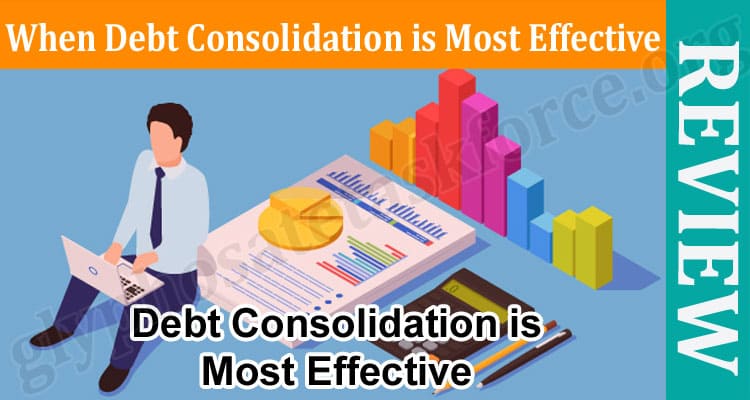Debt Consolidation: You’re having a heck of a time managing all the bills coming in, with all their varying due dates and payments. Well, there’s a financial strategy called debt consolidation that can streamline your bill paying and may also save you money. However, you want to be sure the approach is right for you. With that said, here’s when debt consolidation is most effective.
Table of Contents
What is Debt Consolidation?
This strategy merges multiple debts into a single payment. Typically, the debt involves high-interest credit card bills. If you can get a lower, money-saving interest rate, you can shrink your total debt and pay it off faster.
Types of Debt Consolidation
There are multiple ways you can consolidate your debt. The best way for you will depend on your credit score and debt-to-income ratio.
- Debt consolidation loan. Yes, you can get a loan with poor or fair credit, but to make consolidation truly worthwhile, you want to have a score that can get you the best rate. In any case, you can use the loan funds to erase your debt, then repay the loan over a set term.
- Balance transfer card. You’ll need good credit to qualify, but you can shift all your high-interest credit card debt onto this 0%-interest card. You’ll also need to be able to pay it off during the promotional period (a year or more) before the rate shoots up.
- Home equity loan. There’s a reason you can get a low rate with this kind of debt consolidation: your home is the loan’s collateral. This means that if you default, you could very well lose your house. Try to avoid this consolidation approach.
When is Consolidation Most Effective?
Consolidation works best when:
- You’ve got the credit score to qualify for a balance transfer card or low-interest consolidation loan.
- Your monthly debt payments, including your mortgage or rent, are no more than half your monthly gross earnings.
- You’ve got a cash flow that, each month, covers your debt payments.
- You can repay a debt consolidation loan within five years.
Let’s say that your credit is good, and you have a handful of credit cards with interest rates that range between 17.99% and 23.99%. You might be eligible for a loan with a 7% interest rate – much better than what you’re currently paying.
One attractive feature of consolidation is that it offers an end date for your obligations. A loan with a term of three years means that your debt nightmare will be over in three years – if your spending is reined in and you make timely payments. Conversely, if you’re just making minimum payments, debt clearance could take years.
Note that there is further actionable debt information for Las Vegas residents, who are currently dealing with higher-than-average credit utilization rates during this inflationary period, on top of a relatively high cost of living.
When is Consolidation Not a Great Idea?
The strategy isn’t a panacea if your spending is a problem since that’s what likely got you in trouble. It also isn’t worth it if your debt has overwhelmed you and you can’t see yourself clearing it, even with smaller payments, or if your total debt load exceeds half your income. You’d be better off with debt settlement, an approach offered by Freedom Debt Relief.
Further, if your debt total is such that you can erase it within a year or so at your existing pace, you shouldn’t even bother, especially if the rate for which you qualify wouldn’t save you much.
So, debt consolidation is most effective when you have good credit, your monthly debt payments don’t exceed 50% of your gross pay, you can consistently cover your debt payments, and you can pay off your consolidation loan within five years.
If your situation is more dire, and you can’t see yourself erasing your debt, then debt settlement with Freedom Debt Relief would likely be a better fit.


